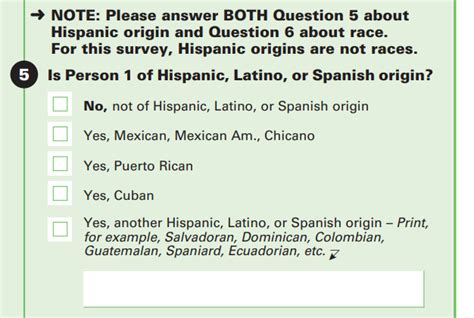The question of whether an individual is Hispanic or not is a common one in various applications, surveys, and forms. This inquiry may seem straightforward, but its purpose and significance are more complex than meets the eye. In this article, we will delve into the reasons behind asking this question and explore its implications.
What Does Hispanic Mean?
Before we dive into the reasons behind asking this question, it's essential to understand what the term "Hispanic" means. The US Census Bureau defines Hispanic or Latino as "a person of Cuban, Mexican, Puerto Rican, South or Central American, or other Spanish culture or origin, regardless of race." This definition encompasses a diverse group of people who share a common cultural heritage, language, or geographic origin.
Why Do Applications Ask If You Are Hispanic?
There are several reasons why applications, surveys, and forms ask if an individual is Hispanic:
- Demographic Data Collection: The primary purpose of asking this question is to collect demographic data. This information helps organizations, governments, and researchers understand the characteristics of their target audience, customer base, or population. By knowing the Hispanic status of individuals, they can tailor their services, products, or policies to meet the specific needs of this group.
- Equal Opportunity and Compliance: In the United States, the Equal Employment Opportunity Commission (EEOC) requires employers to collect data on the racial and ethnic composition of their workforce. This includes asking about Hispanic status. This data helps employers ensure compliance with equal employment opportunity laws and regulations.
- Funding and Resource Allocation: Some organizations, such as government agencies, non-profits, and educational institutions, use Hispanic status to determine eligibility for funding, resources, or services. For example, some government programs provide financial assistance or benefits specifically to Hispanic individuals or communities.
- Research and Analysis: Researchers and analysts use Hispanic status to study demographic trends, health disparities, economic opportunities, and other social issues. This information helps policymakers, business leaders, and community organizations develop strategies to address the unique challenges and needs of Hispanic populations.
Benefits of Asking About Hispanic Status
Asking about Hispanic status can have several benefits, including:
- Improved demographic representation: By collecting data on Hispanic status, organizations can better understand the demographics of their target audience or customer base.
- Tailored services and products: With this information, organizations can develop services, products, or policies that cater to the specific needs of Hispanic individuals or communities.
- Enhanced diversity and inclusion: Asking about Hispanic status can help organizations promote diversity and inclusion by identifying and addressing potential disparities or biases.
- Compliance with regulations: Collecting data on Hispanic status helps organizations comply with equal employment opportunity laws and regulations.
Challenges and Concerns
While asking about Hispanic status can have benefits, there are also challenges and concerns associated with this question:
- Misidentification or misclassification: Individuals may misidentify or misclassify themselves as Hispanic or non-Hispanic, which can lead to inaccurate data.
- Stereotyping and bias: Some individuals may feel stereotyped or biased against due to their Hispanic status, which can impact their self-perception, opportunities, or treatment.
- Lack of representation: Hispanic individuals may feel underrepresented or excluded from certain services, products, or opportunities due to inadequate data collection or analysis.
- Confidentiality and trust: Some individuals may be hesitant to disclose their Hispanic status due to concerns about confidentiality, trust, or potential repercussions.
Best Practices for Asking About Hispanic Status
To address the challenges and concerns associated with asking about Hispanic status, organizations should follow best practices, such as:
- Using clear and concise language: Use simple and straightforward language when asking about Hispanic status.
- Providing examples or definitions: Offer examples or definitions to help individuals understand the term "Hispanic" and how it applies to them.
- Ensuring confidentiality and trust: Assure individuals that their Hispanic status will be kept confidential and that their responses will be used for the intended purpose.
- Avoiding stereotypes and bias: Refrain from using language or examples that perpetuate stereotypes or biases against Hispanic individuals.
Conclusion: Why Asking About Hispanic Status Matters
Asking about Hispanic status is a common practice in various applications, surveys, and forms. While this question may seem straightforward, its purpose and significance are complex. By understanding the reasons behind asking this question and the benefits and challenges associated with it, organizations can promote diversity, inclusion, and representation. By following best practices and ensuring confidentiality and trust, organizations can collect accurate data and develop effective strategies to meet the unique needs of Hispanic individuals and communities.
Image:

Gallery of Hispanic-Related Images:





FAQ Section:
Why do applications ask about Hispanic status?
+Applications ask about Hispanic status to collect demographic data, ensure compliance with equal employment opportunity laws, and allocate resources effectively.
What does the term "Hispanic" mean?
+The term "Hispanic" refers to individuals of Cuban, Mexican, Puerto Rican, South or Central American, or other Spanish culture or origin, regardless of race.
Is it mandatory to disclose Hispanic status?
+No, it is not mandatory to disclose Hispanic status. However, providing this information can help organizations promote diversity, inclusion, and representation.
Engagement Invitation:
We hope this article has provided you with a deeper understanding of why applications ask about Hispanic status. If you have any further questions or concerns, please feel free to share them in the comments section below. Your input will help us create more informative and engaging content in the future.
